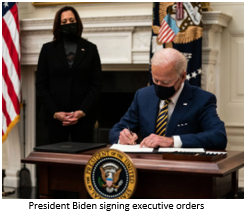Joe Biden and Kamala Harris took office January 20, assuming the burden of righting the American ship. They have a big job and not long for getting it done. They’ll have
Presidential terms run four years, but windows of opportunity for passing major legislation close quickly under the weight of pent-up frustrations in a president’s own party, approaching mid-term elections, and opposition candidates revving their engines on runways for the next presidential race. Biden enjoys no exemption from this cruel cycle. Anyone looking hard enough can
see it looming in the distance.
Biden’s Burden
Biden’s first days have made clear
his priorities: (1) get the pandemic under control, (2) fix the related economic problems, (3)
address climate change, and (4) attack racial injustice. Biden’s team acknowledges things like infrastructure, tax
reform, and rectifying some of former President Donald Trump’s excesses must wait. That array of priorities creates
challenges and opportunities.
(2) fix the related economic problems, (3)
address climate change, and (4) attack racial injustice. Biden’s team acknowledges things like infrastructure, tax
reform, and rectifying some of former President Donald Trump’s excesses must wait. That array of priorities creates
challenges and opportunities.
Fires rage around the four priorities and many reasons exist for tackling them first. The country watches carefully. Other than the rabid COVID-19 deniers, most Americans want an end to the death, pain, and personal sacrifice that go with the pandemic. We can’t imagine anyone being happy with the job losses and business disruption. Many of us have been railing about climate change and racial injustice for years. A strong desire exists for taking on Biden’s targeted issues.
That doesn’t mean his solutions will get unanimous support, or even enough for solid progress. He has offered big, bold proposals for dealing with all four problems. He wants, for example, a $1.9 trillion COVID-19
That’s where the hard choices come. Because Biden’s proposals will draw Republican opposition – even obstruction – he soon must choose between proceeding in the bipartisan way he prefers and taking what he can get with only Democratic support. Thanks to Harris as vice president, he enjoys a one-vote majority in the senate. Speaker Nancy Pelosi presides over a narrow Democratic advantage in the House. Biden has so far refused invitations to set deadlines, but everyone expects a day of reckoning will come. He can keep seeking bipartisan approval or go it alone, knowing he must act quickly or lose his chance.
The Politics
Right now, Biden’s Democratic support results from a coalition of the willing. Moderate
Democrats cut in the mold of senators like Dick Durban of Illinois and John Hickenlooper, a rookie from Colorado, and progressives like Senator Elizabeth Warren of Massachusetts and New York Representative Alexandria Ocasio Cortez remain on board. Nobody knows how long Biden (and Harris) can keep this fragile alliance together. He’s avoided a fracture by making cabinet and staff appointments that have something for everybody and issuing executive orders addressing the pent-up frustrations of both sides of his potentially divided house, a house motivated by intense distaste for Trump. With Trump gone, how long this glue sticks remains an open question.Across the aisle, some Republicans see the virtue in working
with Biden. How many isn’t clear. It’s likely a small number in either house of
Congress. Assuming the filibuster rule remains, if it’s ten in the Senate,
Biden could get 60 votes and potentially pass broad legislation, like he’s
proposed on COVID-19. If it’s one or two, or zero, he’s probably reduced to a
stand-alone vaccine distribution bill many Republicans would vote for or
something he could pass under budget reconciliation that only requires 51
votes. It’s hard to imagine what such bills would look like, but they won’t
have the big, bold provisions Biden wants.
Many Republicans will say they oppose Biden’s bills – especially the COVID-19 relief package -- because of cost. Ordinarily they’d have a point, but under the current unique circumstances, their argument holds much less weight. With interest rates as low as they are, the government can borrow for a big relief package for next to nothing. Given how much the pandemic costs in health care expenses, lost tax revenue, and infrastructure expenditures incurred in fighting the disease, arguably the nation can’t afford not enacting a big package.
A Little History
Biden should keep in mind Barack Obama’s
2009-10 experience with the Affordable Care Act. Obama believed he could get Republican support if he scaled back the bill by (1) leaving out a public option and (2) modeling the program after what Mitt Romney implemented in Massachusetts. Democrats screamed, but Obama held firm. GOP votes never came and Obama, having lost his 60-seat senate majority with the death of Ted Kennedy and the surprise victory of Scott Brown in a Massachusetts special election, settled for no public option and passing the bill underthe reconciliation
procedure.
Biden was there, of course, as vice president, so he’s aware of the dilemma he’ll soon face. The fact the country wants COVID relief as
badly as it does arguably gives him cover. If he can make real progress on ending the pandemic, many people outside Washington won’t care what he asked Congress for and did or didn’t get. He can declare victory and take on the next problem with good will stored away.
Biden doesn’t have forever. Republicans have started showing their hand, complaining about the size and scope of many of his proposals and asking why he hasn’t consulted
more with them. Nearly everyone wants bipartisan solutions to the nation’s problems -- except those who don’t and, unfortunately, some of them serve in Congress.



































